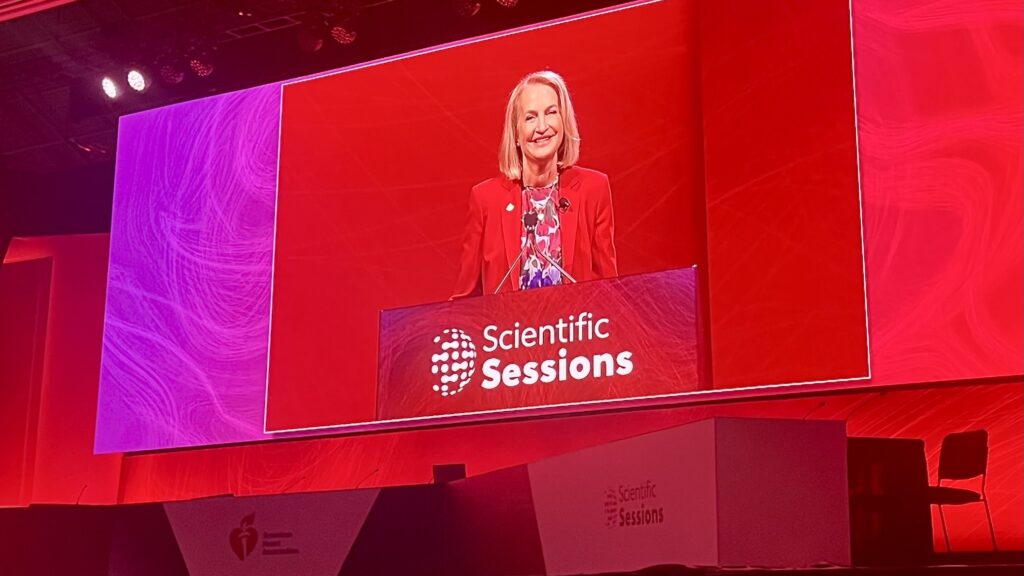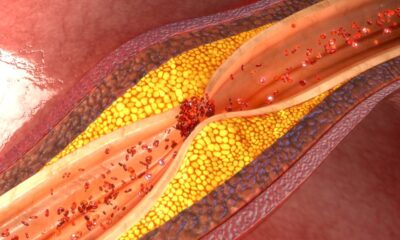Health
New AHA President Champions AI to Close Gender Gap in Cardiology

In her new role as the volunteer president of the American Heart Association (AHA) for 2025-2026, Stacey Rosen aims to leverage artificial intelligence (AI) to address significant gaps in cardiology, particularly regarding women’s health. Rosen, a seasoned cardiologist and executive director of Northwell’s Katz Institute for Women’s Health, has dedicated her career to improving the understanding and treatment of heart disease in women.
Rosen’s perspective is rooted in her extensive experience; she has attended AHA meetings for over three decades and has observed a profound evolution in both the organization and the medical field. She highlights a pivotal moment in 1985 when, for the first time, more women died from heart disease than men. “The minute those mortality curves crossed, it was apparent to us,” Rosen stated. “You couldn’t any longer deny that there was something different about women’s heart health.”
Transforming Cardiovascular Research and Treatment
Rosen emphasizes that the AHA’s mission has shifted from merely reducing death rates from heart disease to becoming a “relentless force for longer, healthier lives.” This vision reflects a broader, more inclusive approach to health care, moving beyond traditional metrics to encompass the holistic well-being of individuals and communities.
Her commitment to addressing the disparities in cardiovascular care stems from her experiences in the 1980s when women were significantly underrepresented in clinical trials. She recalls how women often received inadequate treatment or were misdiagnosed. “Even something as simple as a baby aspirin a day had studies that were 100% male,” she noted. “That just didn’t make sense.”
Despite the passage of the Reconciliation Act in 1993, which called for the inclusion of women in clinical research, data reveals ongoing disparities. According to analyses of research published in AHA journals from 2017 to 2022, women represented only about 30% of clinical trial participants. Rosen attributes this to various factors, including a lack of female scientists in cardiology and preconceived notions about women’s willingness to participate in trials.
Innovative Solutions for Gender Disparities
Rosen advocates for a rethinking of clinical trial methodologies, suggesting that innovative technology such as AI could facilitate greater inclusivity. “We need to explore new avenues, whether through telehealth or AI opportunities, to make participation less burdensome,” she explained. This shift is crucial not only for cardiology but across all branches of medicine, where historical bias has often shaped research and treatment protocols.
She points out that the health care system has traditionally been designed by men for men, which can lead to significant blind spots in understanding women’s health. “Cardiology is particularly prominent because heart disease is the leading cause of death globally, driving substantial research funding,” she said. Rosen believes that addressing these gaps is vital for improving health outcomes for both genders.
Concerns persist regarding grant applications for federal research dollars, particularly in light of restrictions around terminology such as “sex” and “disparities.” Nevertheless, Rosen remains optimistic, asserting that fundamental biological differences must be acknowledged and incorporated into scientific research. “This is basic science—XX and XY chromosomes matter,” she stated.
As AHA enters a new era under Rosen’s leadership, she envisions a future where health care equity is paramount. “We need collaboration among various specialties to tackle maternal health and optimize health outcomes for women throughout their lifespan,” she said.
Rosen’s commitment to women’s cardiovascular health underscores the necessity of integrating sex as a biological variable into research and treatment strategies. Her vision includes ensuring that the health practices established in early adulthood—especially during pregnancy—support lifelong heart health.
With advances in technology and a renewed focus on inclusive research, Rosen believes the medical community can make significant strides in addressing long-standing gender disparities in heart health. As she embarks on this critical journey with the AHA, her leadership promises to drive meaningful change in how cardiovascular health is understood and treated for women.
-

 Science1 month ago
Science1 month agoNostradamus’ 2026 Predictions: Star Death and Dark Events Loom
-

 Technology2 months ago
Technology2 months agoOpenAI to Implement Age Verification for ChatGPT by December 2025
-

 Technology7 months ago
Technology7 months agoDiscover the Top 10 Calorie Counting Apps of 2025
-

 Health5 months ago
Health5 months agoBella Hadid Shares Health Update After Treatment for Lyme Disease
-

 Health5 months ago
Health5 months agoAnalysts Project Stronger Growth for Apple’s iPhone 17 Lineup
-

 Technology5 months ago
Technology5 months agoElectric Moto Influencer Surronster Arrested in Tijuana
-

 Science2 months ago
Science2 months agoBreakthroughs and Challenges Await Science in 2026
-

 Education5 months ago
Education5 months agoHarvard Secures Court Victory Over Federal Funding Cuts
-

 Health5 months ago
Health5 months agoErin Bates Shares Recovery Update Following Sepsis Complications
-

 Science4 months ago
Science4 months agoStarship V3 Set for 2026 Launch After Successful Final Test of Version 2
-

 Technology7 months ago
Technology7 months agoMeta Initiates $60B AI Data Center Expansion, Starting in Ohio
-

 Technology6 months ago
Technology6 months agoDiscover How to Reverse Image Search Using ChatGPT Effortlessly





















